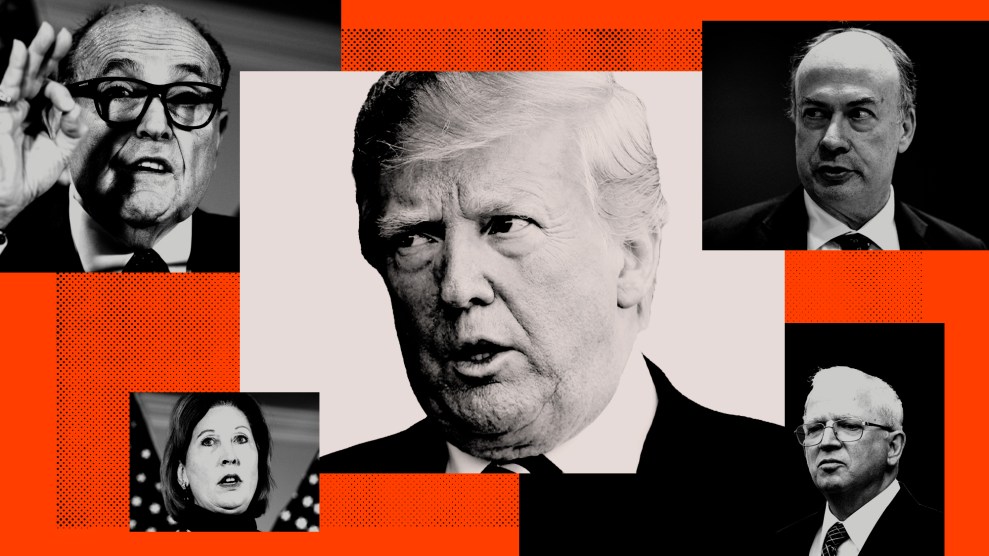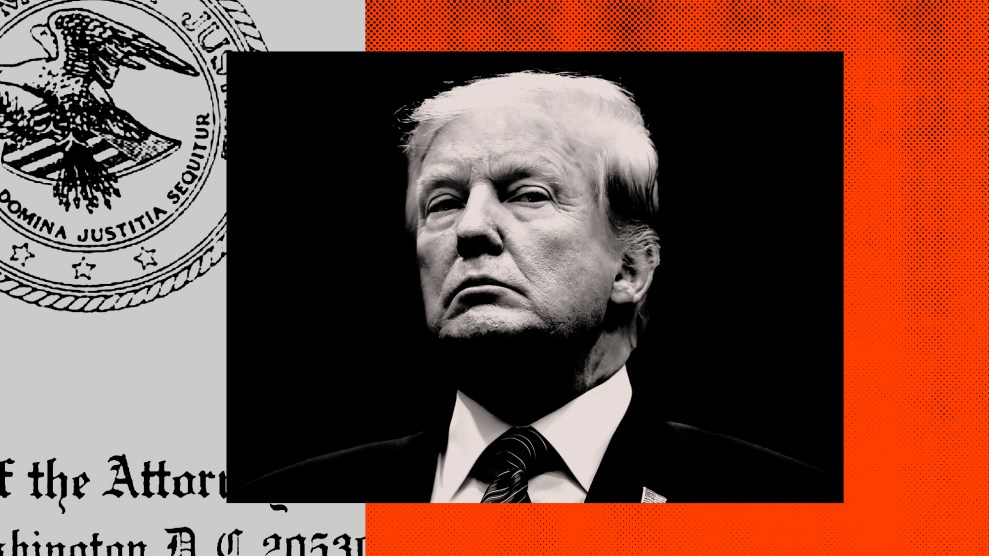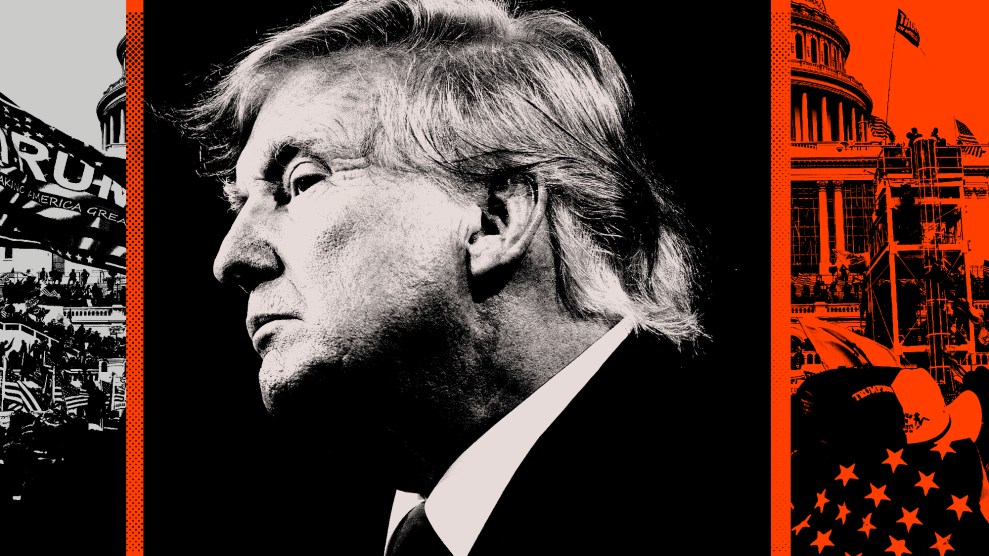
Clockwise from top left: Rudolph Giuliani, Donald Trump, Jeffrey Clark, John Eastman and Sydney Powell.Mother Jones illustration; Getty (3); AP (2)
One of the defenses Donald Trump preemptively offered ahead of his indictment Tuesday was that he was “advised by many lawyers” as he attempted to overturn the 2020 election.
It turns out there’s a big problem with that argument: The Justice Department alleges that several of those lawyers are criminals, too. The charging document says that Trump enlisted at least six “co-conspirators to assist him in his criminal efforts to overturn the legitimate results of the 2020 presidential election and retain power.” Five are attorneys.
The alleged co-conspirators are not named in the indictment, but the five lawyers seem to be identifiable based on information detailed by prosecutors. They include Rudy Giuliani, John Eastman, former Justice Department official Jeffrey Clark, and Kenneth Chesebro. Sidney Powell, the self-styled “Kraken lawyer” who alleged without evidence that Trump was the victim of a vast international conspiracy, also appears to be among the alleged conspirators. That’s a slight surprise, since there had been little recent reporting indicating that Powell was being closely scrutinized by Jack Smith, the special counsel leading the probe.
The description of these people as “co-conspirators” suggests they could eventually be indicted by the Washington, DC, grand jury that indicted Trump, but as of now, none of them face criminal charges.
Rudy Giuliani
The indictment describes “co-conspirator 1” as an attorney “who was willing to spread knowingly false claims and pursue strategies” that Trump’s 2020 reelection campaign would not pursue. The indictment details this conspirator’s efforts to pressure state officials to take part in Trump’s efforts to get GOP-dominated state legislatures to intervene on his behalf.
On December 7, 2020, for example, “co-conspirator 1” wrote to Michigan’s Senate majority leader: “I need you to pass a joint resolution from the Michigan legislature that states that, *the election is in dispute,* there’s an ongoing investigation by the Legislature, and* the Electors sent by Governor Whitmer are not the official Electors of the State of Michigan…” The indictment notes the election in Michigan was not in dispute at the time.
A lawyer and a spokesperson for Giuliani acknowledged he appears to be co-conspirator 1 and criticized the indictment.
“Every fact Mayor Rudy Giuliani possesses about this case establishes the good faith basis President Donald Trump had for the actions he took during the two-month period charged in the indictment,” Ted Goodman, the Giuliani spokesperson, said in a statement. “This indictment eviscerates the First Amendment and criminalizes the ruling regime’s number one political opponent for daring to ask questions about the 2020 election results.”
Goodman said that the indictment suggests a “two-tiered justice system—one for the regime in power and the other for anyone who dares to oppose the ruling regime,” and he cited unsubstantiated allegations that President Joe Biden “and his family made millions of dollars in bribes from America’s most intransigent adversaries.”
John Eastman
The indictment describes “co-conspirator 2” as an attorney “who devised and attempted to implement a strategy to leverage the Vice President’s ceremonial role overseeing the certification proceeding to obstruct the certification of the presidential election.”
That seems to describe John Eastman, a onetime clerk for Supreme Court Justice Clarence Thomas, who works for the Claremont Institute, a far-right think tank. Eastman crafted Trump’s plan to create slates of pro-Trump “fake electors” in states that Joe Biden won. Eastman, who faces potential disbarment in California, did not respond to requests for comment.
Sidney Powell
The indictment describes “co-conspirator 3” as an attorney whose conspiracy theories Trump “embraced and publicly amplified,” even though he privately acknowledged to others that the unfounded claims of election fraud sounded “crazy.”
That matches public reports about Powell, who gained notice representing former national security adviser Michael Flynn after he pleaded guilty in 2017 to lying to FBI agents. Powell joined Trump’s legal team after Election Day in 2020, vowing to prove that vast election fraud had cost him the race. At an infamous news conference with Giuliani, she described a sprawling international election-fixing conspiracy involving China, George Soros, antifa, the media, and the dead Venezuelan dictator Hugo Chávez. She never produced any legitimate evidence for her claims and has since faced various legal sanctions for filing unsupported lawsuits challenging Trump’s defeat. Powell and an attorney who has represented her did not respond to requests for comment.
Jeffrey Clark
“Co-conspirator 4” is described in the indictment as a Justice Department official who focused on civil matters and worked with Trump to “use the Justice Department to open sham election crime investigations and influence state legislatures with knowingly false claims of election fraud.”
That is an obvious reference to Clark, who maneuvered in late 2020 and early 2021 to be appointed acting attorney general by Trump. Clark, who had support from far-right House Republicans, drafted a letter he hoped to send to legislators in states Trump narrowly lost that claimed, falsely, that the Justice Department had “identified significant concerns” about the vote and urged them to consider sending to Congress “a separate slate of electors supporting Donald J. Trump.” Clark’s effort was thwarted when other top DOJ officials threatened to resign en masse if Trump appointed Clark. Trump then backed down.
Clark, who has denied he broke the law, did not respond to inquiries.
Kenneth Chesebro
The indictment states that “co-conspirator 5” was an attorney who “assisted in devising and attempting to implement a plan to submit fraudulent slates of presidential electors to obstruct the certification proceeding.”
The indictment’s description of this person’s actions matches those of Chesebro, a lawyer who first outlined, in a memo sent to Giuliani, a plan for Trump to try to convince Pence to halt the certification of Joe Biden’s victory on Jan. 6, 2021. Chesebro did not respond to an inquiry.
The sixth unnamed co-conspirator is described as a political consultant who “helped implement” the fake electors plan. It was not immediately clear Tuesday night who this referenced. But this person’s identity likely will be known in short order.
Abigail Weinberg contributed reporting for this story.
Top image credits: Tom Williams/CQ-Roll Call, Inc/Getty (2); zz/KGC-375/STAR MAX/IPx/AP; Bill Clark/CQ-Roll Call, Inc/Getty; Jae C. Hong/AP








